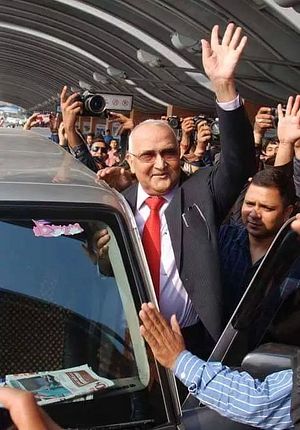Khadga Prasad Oli, of the Communist Party of Nepal (Unified Marxist-Leninist), was elected prime minister of Nepal on October 12, becoming the first prime minister of the country under the newly promulgated national constitution. Oli received 338 votes in the country’s 597 member parliament. Oli inherits a nation with a range of political and economic challenges, including ongoing reconstruction after a devastating series of earthquakes earlier this year and, more recently, a crisis over the representativeness of the country’s new constitution. Oli replaces Sushil Koirala of the Nepali Congress (NC) party as the new prime minister. Koirala received 249 votes in the country’s parliament.
The 63-year-old Oli has a reputation as an outspoken populist in Nepal and has had a long career in national politics. Under his leadership, the CPN (UML) has been able to rally the support of smaller parties in the country. Per the Guardian, Oli’s leadership has even caused the rival United Communist Party of Nepal (Maoist) to rally with the CPN (UML) to back Oli. It remains to be seen if Oli is the kind of leader that could reconcile the ongoing constitutional crisis in which the historically disenfranchised Madhesis and Tharus of the Terai (Nepal’s southern plains) have risen up against the elites in Kathmandu. The new prime minister’s election was met with new protests, emphasizing that reconciliation won’t come swiftly or painlessly to Nepal.
That Koirala and the National Congress are out of power is bad news for India, which is already facing the ire of Nepal’s political elites over accusations that it is economically blockading the country. Historically, Nepal’s National Congress has shared an affinity with the Indian National Congress (INC) party across the border, which ruled in New Delhi for much of independent India’s history. The INC has been in opposition since 2014 and relations between Nepal and India, in the meantime, have taken a nosedive. Oli has no particular affinity for India and is expected to reevaluate Kathmandu’s relationship with New Delhi.
Nevertheless, Indian Prime Minister Narendra Modi congratulated Oli and spoke with him on Sunday afternoon, the Hindustan Times reports. Modi emphasized India’s historic ties with Nepal and expressed interest in working with the new Nepali prime minister. “Spoke to Shri KP Oli. Congratulated him & invited him to visit India. We value ties with Nepal & want to strengthen them even further,” Modi noted on Twitter.
New Delhi’s task in Nepal — to see the country’s constitution rewritten with amendments that include the disenfranchised people of the Terai — will be difficult going forward, especially if it can’t work with Oli’s government. Oli’s party helped push the new constitution through, after all. Plus, India has seen goodwill toward its interests decline across Nepal after Indian trucks that normally transport goods to Nepal refused to cross the border. Nepalis have accused India of formally blockading the country, but the Indian government maintains that there “is no blockade by India on Nepal either official or unofficial.”
The political situation in Nepal remains in flux. As of this writing, Oli’s new government is still in the process of being formed. It is unclear exactly which parties will join the new government. Additionally, it is unclear how exactly the new prime minister will choose to navigate the constitutional crisis. Amending the constitution at this point could appear as a kowtow to Indian pressure and cost legitimacy, both to Oli’s leadership and the constitution itself. Prashant Jha, the Hindustan Times‘ correspondent for Nepal, however, notes that Oli has shown some flexibility in addressing the grievances of the Terai constituencies and could yet work toward reconciliation.

































